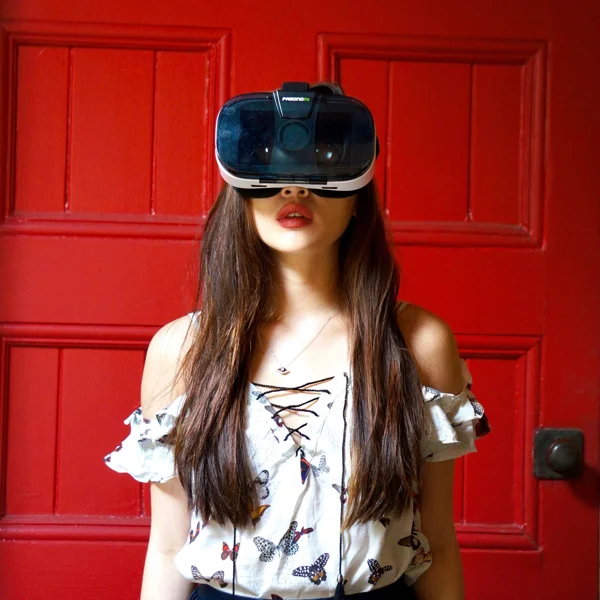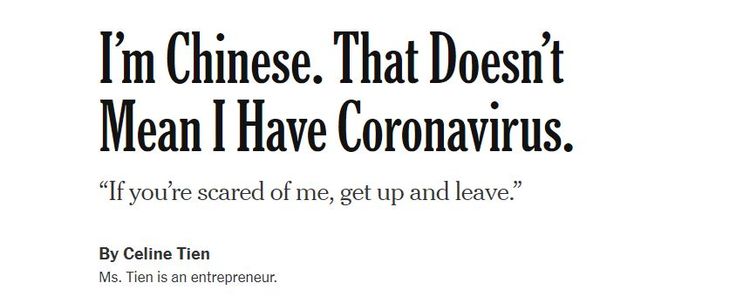 “Also, my dad died defending Vietnam when you Chinese invaded in 1978.”
“Also, my dad died defending Vietnam when you Chinese invaded in 1978.”

By Steve Sailer
03/08/2020

The New York Times continues to deliver 100 octane iSteve content from extremely self-pitying young women of quasi-color. Granted, this might possibly be a Godfrey Elfwick/Titania McGrath-style parody, but Celine Tien appears to be an actual adventuress with sizable web presences as an actress and businesswoman.
I’m Chinese. That Doesn’t Mean I Have Coronavirus.
“If you’re scared of me, get up and leave.”By Celine Tien
Ms. Tien is an entrepreneur.March 7, 2020
Because of misplaced fear, Asians may be facing something more contagious than Covid-19: harassment and racism.
LOS ANGELES — I turned 24 last month. The day before my birthday, I walked into a nail salon to get myself a birthday manicure. After I was seated, a nail technician walked over. She was an Asian woman in her 50s. She sat down and I smiled at her. I couldn’t see if she smiled back because she was wearing a face mask.
NYT editor: “Are you sure your manicurist wasn’t a beefy middle aged white man wearing a MAGA hat and a Confederate flag t-shirt?”
The technician looked at my hands, as if considering their shape, and then suddenly asked, “Are you Chinese?”
“I am,” I responded. “Are you?”
“No,” she said quickly, “I am Vietnamese. We all are in the salon. But are you from-China Chinese?” She raised an eyebrow, her tone like the edge of a blade, sharp and cold.
I shifted uncomfortably in the seat, suddenly very aware she was holding my hands. “I’m from mainland China and Taiwan.”
“You know, we are scared of you Chinese people,” she said loudly, because you eat “weird” food “and bring it here. Chinese people, I don’t like you, you are so bad, so bad and so gross.”
 “Also, my dad died defending Vietnam when you Chinese invaded in 1978.”
“Also, my dad died defending Vietnam when you Chinese invaded in 1978.”
Generally speaking, these NYT op-eds in which a young lady of color quotes something racist somebody said to the author are awfully improbable. But who knows what some impoverished indentured servant/manicurist/sex slave might have said …
There was a moment when I couldn’t even hear what she was saying anymore. I could only focus on the slight shifts in her face mask as she continued to rant.
Finally, my voice cracking, I said: “I just came back from China in January. If you’re scared of me, get up and leave.” The technician went silent.
Then I ripped off her mask and sneezed in her face.
The manager, who had been listening nearby, ran over to intervene. When I looked up, I realized everyone in the salon had been listening. I turned to the woman on my right, then to the other workers who were to my left. Each person I turned to looked away. The room was silent.
The manager made my nail technician leave and apologized quietly, offering a free manicure. I bit my lips to stop the trembling.
This past month, I’ve made less eye contact with people when I’ve walked outside. When I felt like coughing, I smothered the urge by biting my tongue. When I went to shake someone’s hand at a party, I instinctively scanned their arm for the tiniest jerk back, a moment of hesitation. When I went to a restaurant in Santa Monica, Calif., the awareness of my being the only Chinese person sat heavier in my gut than anything I ate at lunch.
 Santa Monica restaurants are of course notorious for the heaviness of their cuisine.
Santa Monica restaurants are of course notorious for the heaviness of their cuisine.
Santa Monica is whiter than most other places in Southern California at 64% non-Hispanic white, but it’s 10% Asian. So it’s not like Chinese persons are so rare that white people are constantly rushing up to them to touch their long, silken tresses.
Have you ever noticed that a major theme in NYT Young-Lady-of-Color opeds is the intolerable ignominy of not being in the majority? It’s almost as YLOC op-edists don’t like diversity.
All the while, I watched news headlines snowball from unforgiving takedowns about Chinese people and their supposed “hygiene problems” to random pictures of Asian-Americans walking down the street splayed as cover art for articles about non-Asian coronavirus patients.
It dawned on me: Sensational reporting and social media were making fear more contagious than the virus itself.
I realized my friends in the United States read only the headlines about the coronavirus but knew nothing about the stories behind them. They didn’t hear from our family friend whose mother, a doctor, flew from Guangdong Province to Wuhan to volunteer with thousands of other hospital workers.

To be precise, I didn’t personally fly to Wuhan to volunteer with thousands of other hospital workers. I would have, but I was too busy updating my Instagram account. But racially, I did do that, more or less.
They didn’t see the lines etched into doctors’ and nurses’ faces from wearing face masks and goggles nonstop for weeks.
My non-Asian friends don’t have friends in China who carefully ration their meals into daily slivers because supermarket shelves are empty. They don’t see the internet activity in cities across Asia, where people come together to comfort one another during quarantine, to be together even when they are apart.
People in America aren’t sharing enough of these stories because what they really want to share is fear. Fear generated by the headlines that my friends whisper about over every meal.
Fear arouses us more. Fear is viral. When fear is coursing through every group chat, Instagram story, news headline, people don’t stop to ask: Are we hurting anyone by perpetuating it?
After I rushed home from the nail salon that day, my mother and I called the owner. We asked her to let us come into her store and speak to her staff. The owner agreed.
The next morning, my mother, two friends and I gathered in a circle with the entire salon staff of Asian women. At first, no one said anything. But slowly, one by one, they started asking questions that revealed their foremost fear: the coronavirus death rate.
I brought up a report by the Chinese Center for Disease Control and Prevention: It had the Covid-19 fatality rate at 2.3 percent. The latest report from the World Health Organization shows the global fatality rate at 3.4 percent, but the rate varies from country to country. In South Korea, where thousands have been tested and 35 have died, the rate is currently about 0.6 percent.
And considering that the number cases that are not reported — because of mild symptoms — is probably high, epidemiologists believe that the death rate could be under 1 percent, and even lower in China once you look outside of Wuhan. About 80 percent of Covid-19 cases appear to be mild and do not require medical treatment. They resolve on their own. Chinese analysts have found that 1.2 percent of Covid-19 cases are completely asymptomatic.
We also talked about how perpetuating harmful stereotypes that Chinese people eat “weird” food can be detrimental not just to Chinese people but also to all Asians. After all, to many Americans, we all look the same.
My voice a little unsteady, I shared with the women that the incident in the salon left me shaky for the rest of the day. That by nighttime, my anger had melted away to tears, leaving me collapsed on the couch.
But something haunted me more than the nail technician’s rant: The silence in the room when everyone heard it.
Silence is deafening. Silence is enabling. In my family people call me the pit bull because I’m the first to fight back if someone attacks my people. In the one moment I tried and failed to be my own pit bull, no one stepped in to be mine.
At the end of our conversation, there was a brief silence, and then a woman stepped forward. She said quietly: “This has happened to me too. People said bad things to me, too, because of virus.” The manager, who had been profusely apologizing, stopped. Her face softened to sadness.
“Customers come in and ask me again and again, am I Chinese, have I been to China, do I have the virus,” she said. “I didn’t know what to say before when people say bad things. Now I know.”
The moral of the story: All of us billions of Asians must band together against the Real Enemy: fear, fear and White People. You Vietnamese Jungle Asians will of course be glad that you enjoy the leadership of us Chinese Fancy Asians.
The coronavirus is serious. It is worth taking protective measures against. I am also wary of it. But in the past few weeks, I’ve learned to be fearful of things possibly more contagious than Covid-19: racism and the silence of those who witness it.
If you see someone like me being harassed or attacked, step in. Say something. If you can’t say something, at least check on the person afterward. Share facts on social media about Covid-19, not fear.
I have a little brother I want to protect and parents who I hope can walk into a store and not be made to feel inhuman. With every word I write, I think: We cannot forsake love even in fear, because that’s when we need it most.
Celine Tien is the founder and chief executive of Flowly: Relaxation Training, a mobile virtual reality app for chronic pain and anxiety management.
Ms. Tien is clearly an expert at managing anxiety in order to relax.
[Comment at Unz.com]
This is a content archive of VDARE.com, which Letitia James forced off of the Internet using lawfare.